Seat Leon >> Brake fluid and clutch: Renew
CAUTION
|
NOTICE Only use new genuine brake fluid in accordance with standard US FMVSS 116 DOT 4.
Brake and clutch system: Changing brake fluid
CAUTION
|
Special tools and workshop equipment required
- Brake filling and bleeding unit - VAS 5234-
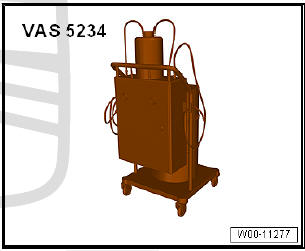
- Bleeder set - VAS 6564-
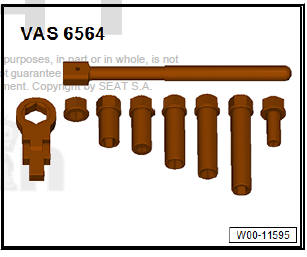
- Depending on the equipment, the front and rear brakes need to be bled in installed condition using the tool set for brake bleeding - VAS 6564- .
Extracting brake fluid
- Remove the plug -1- from the brake fluid reservoir.
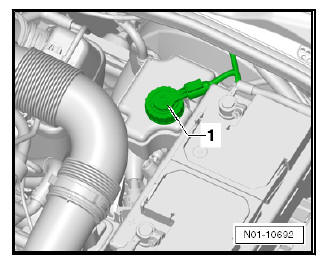
- Using the suction hose from brake filling and bleeding unit , extract as much brake fluid -2- from the brake fluid reservoir as possible through the strainer -1-.
NOTICE The strainer in brake fluid reservoir must not be removed.
Ensure that no brake fluid runs through the strainer after completing the extraction (the brake fluid level in the reservoir must be even with the lower edge of the strainer).
| CAUTION The siphoned (used) brake fluid can not be re-used. |
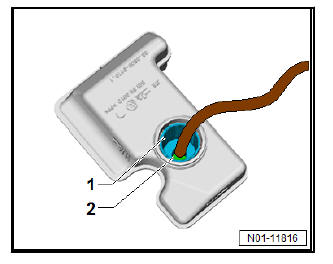
NOTICE When working on the electrical system with some electrical consumers switched on, such a e.g. the brake filling and bleeding equipment - VAS 5234- , the battery must be charged with a charging device with "support mode", in order to prevent damage to the battery.
- Attach adapter -1- of brake filling and bleeding equipment - VAS 5234- to brake fluid reservoir.
- Connect the filler hose of the brake filling and bleeding equipment - VAS 5234- to the adapter -1-.
- Set correct pressure in brake filling and bleeding equipment - VAS 5234- (see Owner's Manual).
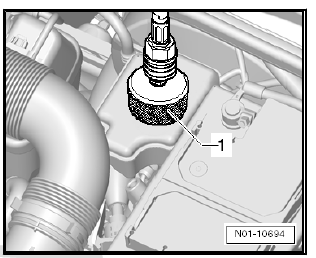
Vehicles with manual gearbox
- Remove the air filter housing, where necessary.
- Diesel engines
- Petrol engines
- Remove the purge screw cap from the clutch slave cylinder.
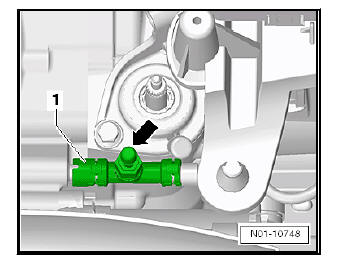
- Connect the breather line of the brake filling and bleeding equipment - VAS 5234- to the bleeder screw -arrow- of the slave cylinder -1-.
- Open the bleeder screw and drain approx. 0.1 litres.
- Close the bleed screw.
- Rapidly operate clutch pedal from stop to stop 10 to 15 times.
- Open the bleeding screw.
- Drain of approx. 0.05 l. of brake fluid.
- Close bleed screw and install cover cap.
- Press the clutch pedal several times.
- If removed, install air filter housing:
- Diesel engines
- Petrol engines

Continuation for all vehicles
- Remove the bleeder screw caps -1- on the brake callipers.
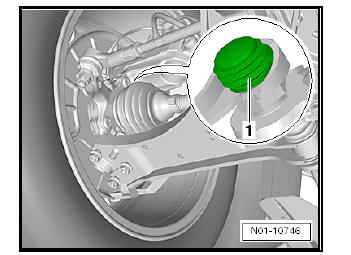
- Connect bleeder hose -1- of the front left bleeder hose.
- Open bleed screw and let appropriate quantity of brake fluid run out.
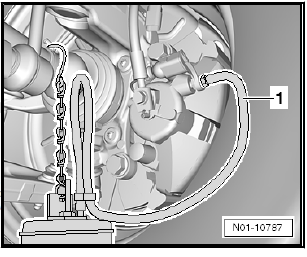
NOTICE Start with front right brake caliper on RHD vehicles.
Use suitable bleeder hose. The pipe must be connected tightly onto the bleeder screw, so that no air enters the brake system.
- Then pull off bleeder screw, pull off breather hose and attach the protective cap to the bleeder screw.

- Repeat the bleeding process in the rest of the brake calipers following the indicated order.
- Fill the brake fluid reservoir to the "MAX" mark, taking into account the wear to the brake pads, and screw on the cap-1-.
- Start the engine and check the run and pressure of the brake pedal. Free play: max. 1/3 of pedal travel.
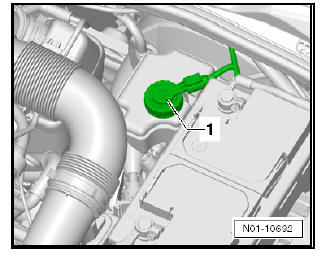
NOTICE If there is excessive brake pedal movement, check for leak faults in the brake system and / or repeat the air bleeding process.
- Perform a test drive of the vehicle to check the operating function of the brakes.
Table of work sequence and brake fluid quantities

 Brake fluid level according to wear of
pads: check
Brake fluid level according to wear of
pads: check
Only use new genuine brake fluid in accordance with standard
US FMVSS 116 DOT 4.
CAUTION
Do not under any circumstances allow brake fluid to come
into contact with fluids that contain ...
 Headlights - check adjustment
Headlights - check adjustment
Special tools and workshop equipment required
Headlight adjustment unit
The following descriptions for adjustment and verification are
generally valid for all countries. However, national legi ...
See also:
Removing and installing trim panel for B-pillar
(front door)
Removing
Move door window to "open" position.
Remove the seal -1- of the rear window guide in the area of
the trim -4-.
Unscrew and remove the screws -Arrows a-
Remove spreader blocks.
S ...
